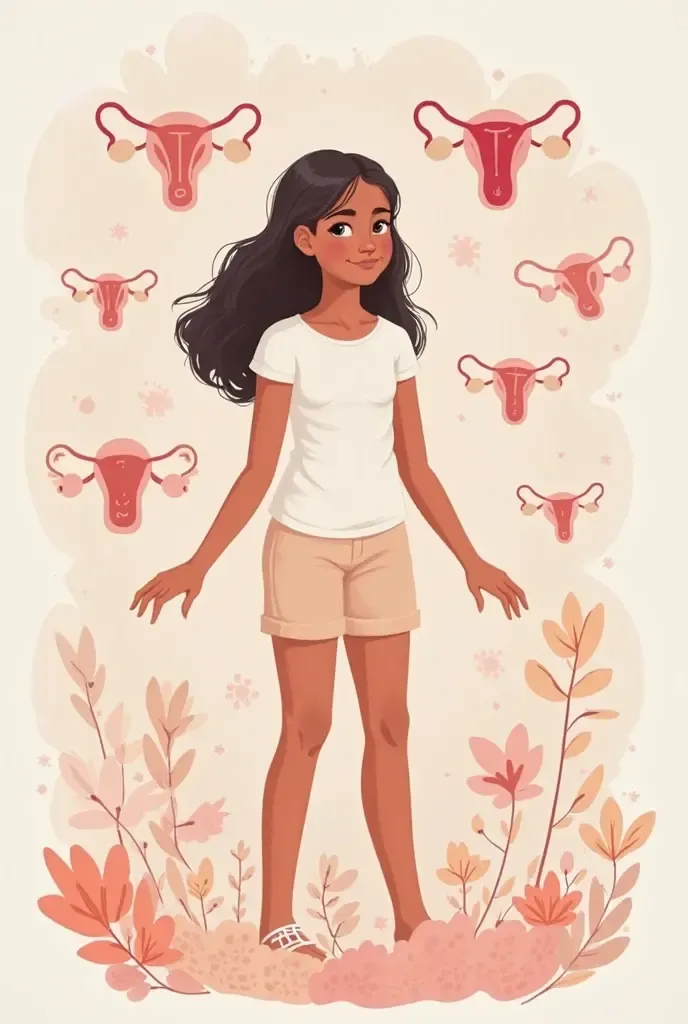Early Signs of PCOS: Recognizing the Warning Signals
Early Signs of PCOS. Polycystic Ovary Syndrome (PCOS) is one of the most common hormonal disorders affecting women of reproductive age, yet it often goes undiagnosed for years. Understanding the early warning signs is crucial for timely intervention and management. This comprehensive guide will help you recognize the initial symptoms of PCOS and understand when to seek medical attention.
What is PCOS?
PCOS is a hormonal condition that affects how the ovaries function. With PCOS, many small fluid-filled sacs (cysts) develop along the outer edge of the ovaries, containing immature eggs that fail to be released regularly. This leads to hormonal imbalances, particularly elevated levels of androgens (male hormones) and potential insulin resistance Mayo Clinic.
What to do next after noticing pregnancy symptoms?
If you are experiencing symptoms of pregnancy and have an intuition that maybe you are pregnant, then taking a home pregnancy test immediately after missing your period is a sensible move. If the results are negative, you should repeat the test after two weeks to receive more reliable results. If the results continue to be negative, consult a doctor for a full medical examination.

How to ensure a healthy pregnancy with PCOS?
PCOS increases the risk of complications during pregnancy. So after you get an assurance of your pregnancy, keep these pointers in mind for a healthy pregnancy.
Here are some tips to follow during pregnancy with PCOS:
- As soon as you get a confirmation from your doctor about your pregnancy, start monitoring your health more closely and note down necessary details such as blood pressure and basal body temperature.
- Your body needs an extra amount of nutrients to develop the fetus. So it is suggested to start taking folic acid, vitamins, and calcium even before you get pregnant after consulting with your medical practitioner.
- Avoid eating junk foods and exercise daily to avoid bloating, indigestion, and stiffness. Try to add more low-fat protein to your diets, such as chicken and turkey.
- Take a vitamin D supplement if you are deficient as it is required to improve reproductive health and fertility struggles.
- Your blood sugar tends to go high during pregnancy and since there is already low amount of insulin resistance in PCOS, paying close attention to what you eat and not giving in to cravings can help.
The Three Main Diagnostic Criteria
Healthcare providers diagnose PCOS when at least two of these three criteria are present:
- Irregular ovulation (indicated by irregular or absent menstrual cycles)
- Signs of excess androgen levels (either through blood tests or physical symptoms)
- Polycystic ovaries (visible on ultrasound imaging)
Early Warning Signs to Watch For

1. Menstrual Irregularities
The most common early sign of PCOS is irregular periods. This can manifest as:
- Having fewer than nine periods per year
- Periods occurring more than 35 days apart
- Very light or very heavy menstrual flow
- Periods lasting longer than typical (more than 7 days)
- Complete absence of periods after having regular cycles
Many young women dismiss irregular periods as “normal,” especially during the first few years after starting menstruation. However, persistent irregularities beyond two to three years post-menarche should be evaluated Cleveland Clinic.
2. Excess Hair Growth (Hirsutism)
Unwanted hair growth in male-pattern areas is a telltale sign of elevated androgen levels:
- Facial hair (upper lip, chin, jawline)
- Chest hair
- Hair on the back, shoulders, or buttocks
- Thick, dark hair on arms and legs
- Hair around the nipples or on the abdomen
This excessive hair growth affects approximately 70% of women with PCOS and can be particularly distressing for young women.
3. Acne and Oily Skin
PCOS-related acne typically differs from teenage acne:
- Persistent acne beyond the typical teenage years
- Severe, cystic acne that doesn’t respond to usual treatments
- Acne concentrated on the lower face, jawline, and neck
- Excessive oiliness of skin and hair
4. Male-Pattern Hair Loss
Thinning hair or balding in a male pattern (receding hairline, crown thinning) can occur, particularly:
- Hair loss at the temples
- Thinning at the crown of the head
- Overall hair thinning and loss of volume
5. Weight-Related Changes
Many women with PCOS experience:
- Unexplained weight gain, especially around the midsection
- Difficulty losing weight despite diet and exercise efforts
- Increased appetite and cravings, particularly for carbohydrates
- Weight gain that seems disproportionate to caloric intake
6. Skin Changes
Several skin manifestations can indicate PCOS:
- Acanthosis nigricans: Dark, velvety patches of skin, typically found on:
- Back of the neck
- Armpits
- Groin area
- Under the breasts
- Skin tags in areas of friction
- Stretch marks that appear without significant weight changes
7. Mood and Energy Changes
Hormonal imbalances in PCOS can affect mental health:
- Increased anxiety or depression
- Mood swings and irritability
- Fatigue and low energy levels
- Difficulty concentrating
- Sleep disturbances
Early Signs in Teenagers
PCOS can begin showing symptoms even before the first menstrual period. In teenagers, watch for:
- Delayed onset of menstruation (after age 15)
- Severe acne that doesn’t improve with typical treatments
- Excessive hair growth during puberty
- Rapid weight gain during adolescence
- Insulin resistance signs (dark skin patches, increased hunger)
It’s important to note that PCOS cannot typically be definitively diagnosed until 2-3 years after the first menstrual period, as some irregularity is normal during this time Kids Health.
Causes
The exact cause of PCOS isn’t known. Factors that might play a role include:
- Insulin resistance. Insulin is a hormone that the pancreas makes. It allows cells to use sugar, your body’s primary energy supply. If cells become resistant to the action of insulin, then blood sugar levels can go up. This can cause your body to make more insulin to try to bring down the blood sugar level.Too much insulin might cause your body to make too much of the male hormone androgen. You could have trouble with ovulation, the process where eggs are released from the ovary.One sign of insulin resistance is dark, velvety patches of skin on the lower part of the neck, armpits, groin or under the breasts. A bigger appetite and weight gain may be other signs.
- Low-grade inflammation. White blood cells make substances in response to infection or injury. This response is called low-grade inflammation. Research shows that people with PCOS have a type of long-term, low-grade inflammation that leads polycystic ovaries to produce androgens. This can lead to heart and blood vessel problems.
- Heredity. Research suggests that certain genes might be linked to PCOS. Having a family history of PCOS may play a role in developing the condition.
- Excess androgen. With PCOS, the ovaries may produce high levels of androgen. Having too much androgen interferes with ovulation. This means that eggs don’t develop on a regular basis and aren’t released from the follicles where they develop. Excess androgen also can result in hirsutism and acne.

When to Seek Medical Attention
Consult a healthcare provider if you experience:
- Missed periods for three or more consecutive months
- Fertility concerns when trying to conceive
- Rapid onset of excess hair growth or acne
- Significant unexplained weight gain
- Signs of insulin resistance (dark skin patches, excessive hunger)
- Any combination of the above symptoms
Living with PCOS
A healthy lifestyle can help you manage PCOS. Eating a healthy diet and exercising regularly can help ease some of the possible physical and mental issues associated with PCOS. Exercising regularly can also reduce your risk of diabetes and improve your chances of getting pregnant.
You can get further help and advice from the following:
- a gynaecologist
- an endocrinologist
- your local women’s health clinic
- community health centres
- a dietitian
- an exercise physiologist.
If you are unsure, you can also call 13 HEALTH. You can phone and talk to a registered nurse 24 hours a day, 7 days a week, for the cost of a local call.
The Importance of Early Detection
Recognizing PCOS early is crucial because:
- Prevents complications: Early treatment can reduce the risk of type 2 diabetes, heart disease, and endometrial cancer
- Improves fertility outcomes: Managing PCOS can restore ovulation and improve pregnancy chances
- Better symptom management: Early intervention can help control unwanted symptoms like excess hair growth and acne
- Psychological benefits: Proper diagnosis and treatment can improve self-esteem and mental health
What to Expect During Diagnosis
If you suspect PCOS based on these early signs, your healthcare provider may:
- Review your medical and family history
- Perform a physical examination
- Order blood tests to check hormone levels
- Conduct a pelvic ultrasound to examine your ovaries
- Rule out other conditions with similar symptoms
Common Early Signs of PCOS

Irregular Menstrual Cycles
Irregular periods are menstrual cycles that don’t follow a typical pattern, and can also vary in length and amount of bleeding. A typical menstrual cycle happens every 28 days and lasts for four to seven days. Periods that happen every 21 days or more frequently, or those that occur every 35 days apart or longer, are considered irregular.
A regular period allows the body to shed an unfertilized egg, however, in the case of PCOS, irregular ovulation caused by hormonal imbalances can result in irregular or missed periods or periods that seem heavier or lighter than normal.
Tracking your menstrual cycle is a good way to better understand your body’s rhythm and when that rhythm might be out of balance. There are a variety of health apps you can use, or simply making note on a calendar of when you experience menstrual symptoms and how long your period lasts is an easy way to determine if it becomes irregular. Signs you might be experiencing an irregular period include:
- Excessive or heavy bleeding or spotting between periods
- Severe pain during your period
- Frequency—either a cycle that seems too short or too long
- Periods that last longer or shorter than normal
What are some symptoms of PCOS?
PCOS symptoms can vary from person to person depending upon the severity of the hormonal imbalances. For instance, some women with PCOS may have periods continuously for three weeks, while other women may not get a period for three months. However, some of the symptoms of PCOS are the following:
- Irregular menstrual cycles
- Unexplained weight gain
- Cyst on the ovaries
- Insulin resistance
- Male pattern baldness
- Excessive hair growth
- Dark patches on thighs, breast, neck, and arm
- Pelvic pain
- Anxiety or depression
What are some early signs of pregnancy with PCOS?
Having irregular menstrual cycles makes it difficult to determine if you’re pregnant or simply have skipped a period due to PCOS. Although a positive pregnancy test from a medical practitioner is required to be sure of pregnancy, there are a few early indications of pregnancy that can be helpful.
Moreover, if you’re trying to conceive with PCOS, some methods can assist you in controlling your ovulation and improving your chances to conceive.

Risk Factors to Consider
Family history can indicate a woman’s probability of developing PCOS; studies show women with a family history of PCOS are at higher risk. Additionally, obesity, lack of exercise and smoking can lead to developing the syndrome. PCOS typically develops during teen or early adulthood years. Of course, not all women with these additional risk factors will develop PCOS. If you do have these factors, talk with your doctor about steps you can take to mitigate symptoms and monitor your reproductive health.
When to See a Healthcare Provider
Being in tune with your body’s rhythms and menstrual cycle is a good first step in knowing when something is amiss. In the case of PCOS, women who experience the following symptoms should see a doctor:
- Missed or irregular periods
- Noticeably light periods
- Infertility
- Unexplained weight gain, especially in the abdomen
Women who experience these symptoms will most likely have an ultrasound, a computer imaging test that uses sound waves to see the body’s internal organs and systems and one that can detect ovarian cysts. Additionally, a blood test can show heightened levels of androgens and other hormones.
In getting ready for your appointment, try to compile the dates and lengths of your recent periods. Write down any other symptoms that are out of the ordinary, including extra body hair, acne or oily skin.
There are treatments for PCOS, including changes in diet, exercise, hormonal contraceptives such as the birth control pill, medicines that can induce ovulation and diabetes treatments.
Changes in Physical Appearance
Like other hormonal imbalances in the body, PCOS can present changes in physical appearance. Signs to make note of include:
- Excess facial and body hair growth (hirsutism)
- Skin discoloration, especially darkened patches of skin on the neck, armpits or groin areas
- Skin tags on the neck or armpits
- Acne or oily skin patterns
- Thinning hair
Moving Forward
If you recognize several of these early warning signs, don’t wait to seek medical attention. PCOS is a manageable condition when properly diagnosed and treated. With the right healthcare team, lifestyle modifications, and possibly medication, most women with PCOS can effectively manage their symptoms and lead healthy, fulfilling lives.
Remember, every woman’s experience with PCOS is unique. Some may have mild symptoms while others experience more severe manifestations. The key is staying informed, listening to your body, and advocating for your health when something doesn’t feel right.
Early recognition and intervention can make a significant difference in managing PCOS and preventing long-term complications. If you suspect you might have PCOS, schedule an appointment with your healthcare provider to discuss your symptoms and explore appropriate testing and treatment options.





